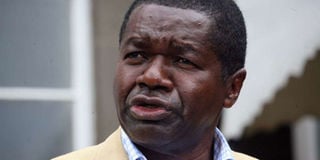James Oswago advises Wafula Chebukati and IEBC

Former IEBC CEO James Oswago at Nairobi Club in July 2016. PHOTO | EVANS HABIL | NATION MEDIA GROUP
What you need to know:
Former chief executive officer James Oswago cautioned Independent Electoral and Boundaries Commission against doing things that would make it seem close to the government.
The National Super Alliance’s concerns, some of which have found their way to courts, more so during the attempts to stop Dubai’s Al Ghurair Printing and Publishing company from printing ballots, have mainly revolved around accusations of the electoral agency doing things in concert with Jubilee Party.
With just 15 days to go to the General Election, a former electoral agency chief executive officer and commissioner have asked the current team to be truthful with Kenyans.
“During our time, the confidence level was high yet we were panicking. The officials should know that a lot of attention is on them because of the prevailing mistrust,” Mr Thomas Letangule said.
Former CEO James Oswago cautioned the Independent Electoral and Boundaries Commission team against doing things that would make it seem close to the government.
'PRESCRIBE SACRIFICES'
“Time may come when power wielders prescribe sacrifices as public catharsis. This is done as atonement and to neutralise public anger at some perceived shortcoming of the electoral commission,” Mr Oswago says.
“It becomes necessary in order to distance State power from collateral damage and to deflect attention. Ask (former IEBC chairmen Samuel) Kivuitu or (Issack) Hassan.”
PUBLIC DISCOURSE
The warning by Mr Oswago, articulated in his commentary Nine Memorable Lessons From 2013, is likely to evoke public discourse as he more or less confirms most of the criticism by the National Super Alliance of the former and current commissions.
Nasa’s concerns, some of which have found their way to courts, more so during the attempts to stop Dubai’s Al Ghurair Printing and Publishing company from printing ballots, have mainly revolved around accusations of the IEBC doing things in concert with Jubilee Party.
During the litigation over the printing of ballots, the political group said awarding of the estimated Sh2.5 billion contract to the company had been influenced by President Kenyatta and some technical staff at the electoral agency.
DISMISSED ALLEGATION
The High Court and Court of Appeal dismissed the allegation and castigated the opposition alliance “for relying on nothing else other than newspaper cuttings”.
Even with the court rulings, Mr Oswago says the allegations have poisoned the country’s political environment.
“The third lesson is that such trust is earned the hard way by greater openness, accountability and, above all, fierce and unimpeachable neutrality by the top leadership of the electoral management body. Greater public confidence in the IEBC, in turn, empowers it to make difficult choices and stand up to the rigging instincts of the deeper State,” Mr Oswago adds.
OPAQUE PROCESS
He admits that the IEBC in 2013, buoyed by the high public confidence, ran a very opaque process and often any criticism of its methods was dismissed offhand.
“For extended periods, the Issack Hassan/James Oswago IEBC soaked endless public adulation. We became entitled. Any critique, however genuine, was ascribed to malevolent internal and external forces and agents of doom. When genuine criticism occurred, for example over the ignoble and aborted procurement of Biometric Voter Registration kits (before the government intervened and procured the same at more than twice the original price) or when well-founded critical issues arose subsequent to the 2013 elections, the commission built a larger mentality,” the former CEO says.
“External criticism immediately after the election was seen as the work of losers, an unfortunate term beloved by the victors. Instead of embracing criticism, even if fickle, and engaging critics in constructive and open discourse, some commissioners became openly hostile to contrary opinions and saw critics as idlers filled with envy and political hate. Even internal dissent was censured. This lack of wisdom and hubris soon ballooned into something monstrous that consumed the commissioners,” Mr Oswago adds.
TO LISTEN
He advises the commissioners to listen and share information.
“Admit openly when mistakes occur and never shun taking responsibility. Your key constituency is the Kenyan masses and no single political formation can intimidate you when your public job approval rating is stratospheric. Remember to moderate public expectation instead of raising it. It is reckless, as one of your more vocal commissioners is fond, to say with finality and absolute certainty, that nothing can ever go wrong. Lastly, never pretend to be an elections management expert. You are not,” says Mr Oswago.
Moderating public expectations, he adds, includes avoiding being over-confident about technology at the commission’s disposal.
Mr Letangule advises the IEBC not to wait until the last minute to test the e-gadgets.
“I would suggest that they do it now so that they have sufficient time to address concerns that may arise,” Mr Letangule said.




